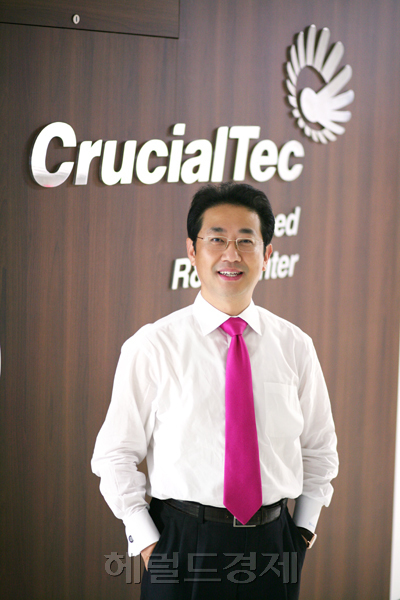Many behind-the-scenes stories about Apple’s former CEO Steve Jobs have received attention since he died in 2011.
His meeting with Softbank CEO Son Masayoshi, who brought a rough concept image of a phone-capable iPod for a business partnership before the first iPhone was developed, was one of the latest episodes divulged.
Another episode related to Steve Jobs and the evolution of the iPhone recently emerged from a local firm.
In a recent interview with The Korea Herald, CrucialTec CEO Charles Ahn said he had a meeting with the top brass of the California-based firm to persuade them to adopt the firm’s optical trackpad, then its flagship product, for the iPhone 3, the second-generation iPhone released on July 1, 2008.
His meeting with Softbank CEO Son Masayoshi, who brought a rough concept image of a phone-capable iPod for a business partnership before the first iPhone was developed, was one of the latest episodes divulged.
Another episode related to Steve Jobs and the evolution of the iPhone recently emerged from a local firm.
In a recent interview with The Korea Herald, CrucialTec CEO Charles Ahn said he had a meeting with the top brass of the California-based firm to persuade them to adopt the firm’s optical trackpad, then its flagship product, for the iPhone 3, the second-generation iPhone released on July 1, 2008.

“All Apple managers working on the team for input devices liked the idea of installing the OTP in the home button of iPhone 3, which could have totally changed the user interface of the iPhones,” Ahn said.
“Jobs, who was the final decision maker for iPhone 3, however, rejected the offer at the last minute.”
If installed with the controller, the iPhones could have had an entirely different story, Ahn added.
The OTP was later mounted on the Blackberry handset, which led the global smartphone market back in 2008.
After the deal with the Canada-based firm, other global mobile makers, including Samsung Electronics, LG Electronics and HTC followed suit, which helped boost the revenue of CrucialTec down the road.
The reason why other smartphone makers adopted OTP was because of the variety of their handsets.
‘‘Unlike Apple, with a sole product line, those companies had many options to explore new functions for their next-generation smartphones,” Ahn added.
The business boom of CrucialTec, armed with OTP, however, was short-lived. The Korean medium-sized tech firm failed to develop a new technology replacing its core product OTP. Its operating profit fell to a deficit for the past two years, posting 8.2 billion won in 2012 and 16.6 billion won in 2013.
Behind worsening performance was reportedly a failure to strike a supply deal for fingerprint sensors for Samsung’s Galaxy S5. The firm announced at its annual shareholders’ meeting in March that it had adopted a dual leadership system as part of its contingency plan to revive the firm. From this year, Ahn and co-CEO Kim Jong-bin will make key management decisions.
By Kim Young-won (wone0102@heraldcorp.com)





![[Herald Interview] 'Amid aging population, Korea to invite more young professionals from overseas'](http://res.heraldm.com/phpwas/restmb_idxmake.php?idx=644&simg=/content/image/2024/04/24/20240424050844_0.jpg&u=20240424200058)











![[KH Explains] Korean shipbuilding stocks rally: Real growth or bubble?](http://res.heraldm.com/phpwas/restmb_idxmake.php?idx=652&simg=/content/image/2024/04/25/20240425050656_0.jpg&u=)

